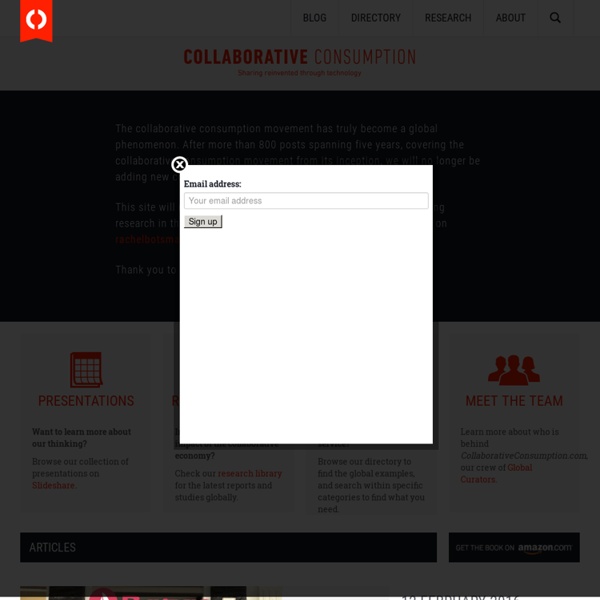



http://www.collaborativeconsumption.com/
The 4 Elements of Social Capitalism All of us have been enabled to use social media as the means to build social capital that enhances our individual and our collective economies. Each of our benefits can be significantly enhanced if the “system” of social media is continuously improved. Improvement will only come if we all learn to use appropriate and relevant knowledge to improve the value social media affords us. For our individual and collective “economic systems” to improve each of us must learn to apply methods that improve our social currency as we chart our course aimed at results we want to produce. Improvement of any system requires knowledge.
Why The Collaborative Consumption Revolution Might Be As Significant As The Industrial Revolution (TCTV) Everything, it seems, is becoming collaborative. From Airbnb to RentCycle to Zipcar, we are swapping our cars, our homes, even our clothes with each other. According to Lauren Anderson from Collaborative Consumption, this change might be as profound as the industrial revolution. It will result, she told me when we met at Fast Company’s Innovative Uncensored event, in a world driven by “reputational capital” in which the “We” of the our collaborative age will replace the “Me” of the industrial age. While Anderson might be right, I’m not sure it’s such a great thing for people like myself who aren’t naturally participatory. Indeed, I find the whole idea of an always-on reputational economy a little creepy – especially since this may not be a world that is able to either forgot or forgive.
Top 50 Free Open Source Classes on Computer Science : Comtechtor Computer science is an interesting field to go into. There are a number of opportunities in computer science that you can take advantage of. With computers increasingly becoming a regular part of life, those who can work with computers have good opportunities. You can find a good salary with a program in computer science, and as long as you are careful to keep up your skills. Here are 50 free opencourseware classes that can help you learn more about computer science: How To: Make Incredible Chocolate Mousse in Five Minutes, with Only Two Ingredients » Man Made DIY I'm not a huge dessert guy. I mean, I like sweets as much as anyone, but I don't crave them often, and would much rather waste the calories on salty, savory foods than baked goods. Well, except for one thing: pudding.
The collaborative economy in your neighborhood: welcome to StreetBank The idea that neighbors can share their resources efficiently is not new, however there are very few examples of successful initiatives to date. Many sharing schemes failed after only a few years. A successful example of such a model is StreetBank, a platform in England that is growing steadily. We took a moment to chat with Sam Stephens, StreetBank’s founder, about the reasons for the site’s growth. StreetBank is an online platform that allows neighbors to collectively share items they possess individually. Future Positive » Gift Economy This single page contains words and links related to the gift economy that have been posted here at Future Positive and at CommUnity of Minds. Also see: GIFTegrity, Read the Scientific Basis for the GIFTegrity, and the Specifications for a GIFTegrity. The Hacker Milieu as Gift Culture by Eric Steven Raymond
Creative/Collaboration as a New Participatory Paradigm? After 6 months of thinking *very hard* about the more controversial things of life, like democracy, creativity and the future of society, *quietly to myself*, I suddenly find myself almost ready to ‘think out loud’ again and publish some unfinished thoughts for others to consider. While this can feel very risky at times I consider that collaborative and public conversations around some of these difficult topics holds enormous value – so I invite you to agree, argue and criticise the ideas and suggestions below as strongly as possible – with a view that this process toughens thinking - hopefully making it more robust and useful. Recap of earlier thinking
Sequences A sequence is a series of multiple posts on Less Wrong on the same topic, to coherently and fully explore a particular thesis. Reading the sequences is the most systematic way to approach the Less Wrong archives. If you'd like an abridged index of the sequences, try XiXiDu's guide, or Academian's guide targeted at people who already have a science background. Benito's Guide aims to systematically fill the reader in on the most important ideas discussed on LessWrong (not just in the sequences).